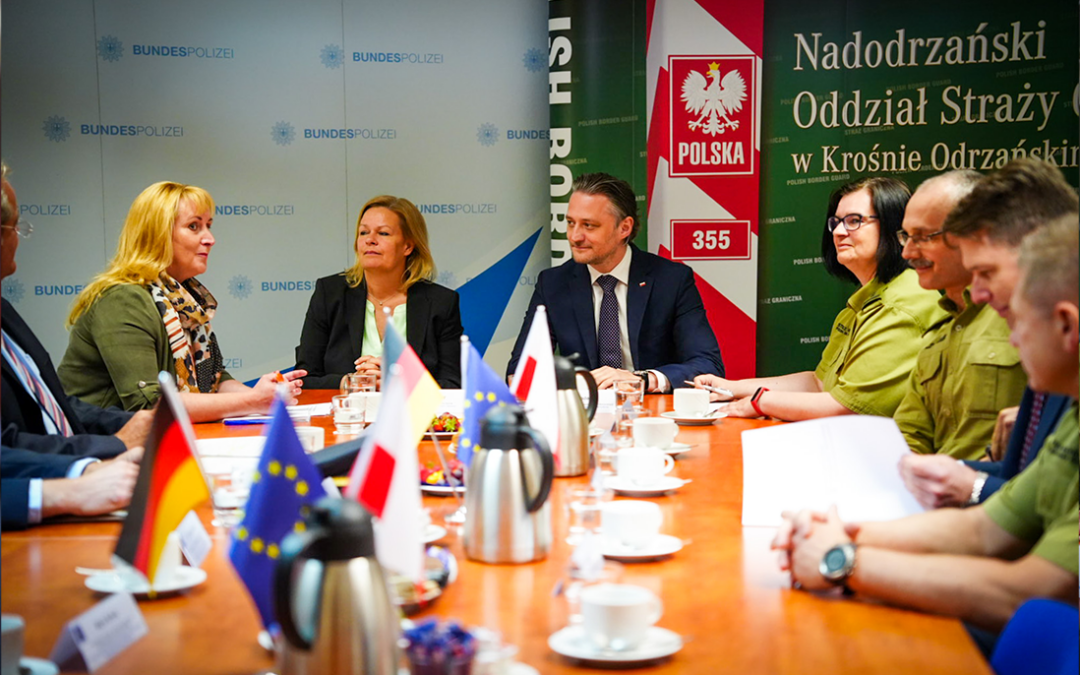Poland and Germany have agreed to jointly strengthen security on their shared border as part of efforts to curb growing irregular migration into Germany.
Two German states recently called for the temporary re-introduction of full border controls, saying that they are finding it increasingly difficult to cope with the growing number of migrants and asylum seekers. Currently, as members of the Schengen Area, Poland and Germany do not have border controls.
Two German states have called on the federal government to reintroduce border controls with Poland and the Czech Republic.
They say it is necessary to stem an "unabated increase in irregular migration" into Germany https://t.co/KuUXmsOzD9
— Notes from Poland 🇵🇱 (@notesfrompoland) May 9, 2023
However, the interior ministries of the two countries announced in a joint statement yesterday that “there is currently no justification for reintroducing border controls” thanks to the “strong and effective measures” already in place “and the high level of cooperation and trust between our border services”.
Instead they have agreed steps “to further strengthen cooperation in order to limit secondary irregular migration” by “strengthening joint patrols and joint inspections” as well as “increased exchange of information on investigative procedures and the reinforcement of staffing in joint offices”.
Poland’s interior ministry noted that these steps would involve more checks on trains, while German interior minister Nancy Faeser said there would also be tighter controls on air traffic, reports Deutsche Welle.
📄 Wspólne oświadczenie Ministrów Spraw Wewnętrznych Polski i Niemiec po wizycie na granicy polsko-niemieckiej ⤵
🇵🇱 @BartoszGrodecki
🇩🇪 @NancyFaeser pic.twitter.com/fPPid8NgKY— MSWiA 🇵🇱 (@MSWiA_GOV_PL) May 30, 2023
In their joint statement, the governments emphasised that strong protection of the European Union’s external borders is key in countering irregular migration, “especially in the face of the instrumentalisation of migration”.
The latter remarks are a reference to a crisis at the border with Belarus since 2021, when the Belarusian authorities began encouraging and assisting thousands of migrants and asylum seekers from Africa, the Middle East and Asia to try to cross into the EU, with most then travelling on to Germany.
The number of attempts to cross the Polish-Belarusian border has fallen from its peak in the autumn of 2021, thanks in large part to Poland’s construction last year of a physical wall and electronic barrier on the border. The German government and the EU have praised Poland for its efforts to stem crossings.
"The Poles have reacted correctly; they are doing a very important service for the whole of Europe," says Germany's interior minister amid a surge in attempted crossings from Belarus
He accused Russia of supporting Belarus's "hybrid threat" against the EU https://t.co/xzQa7yTS57
— Notes from Poland 🇵🇱 (@notesfrompoland) November 9, 2021
However, according to the Polish border guards, at least several dozen people have still been trying to enter the country almost every day in recent months. Those who do successfully cross often go undetected, with some then caught at the Polish-German border but others making their way into Germany.
Between the start of March and mid-April this year, 3,093 illegal border crossings were detected at Germany’s 467-kilometre-long (290 miles) border with Poland and 1,060 at the border with the Czech Republic, according to dpa, citing federal police data. Those figures are expected to increase further in the summer months.
“We are convinced that the issue of irregular migration to and through Europe can only be resolved together at the European level,” concluded the joint statement by Poland and Germany.
Poland has activated the first section of an electronic barrier on its border with Belarus, built in response to last year's migration crisis.
It will be the longest such barrier monitored from a single control centre in the world, says the government https://t.co/IWjO50nzmd
— Notes from Poland 🇵🇱 (@notesfrompoland) November 22, 2022
Meanwhile, a group of around 25 Syrian and Iraqi asylum seekers – many of them children – remain camped out on Poland’s border with Belarus, where they have been for days.
The group says they fear violence at the hands of the Belarusian authorities if they turn back, but Poland is refusing to let them cross.
Yesterday, the European Court of Human Rights (ECHR) rejected a request filed on behalf of members of the group for an interim to allow them into Poland, reports the Gazeta Wyborcza daily. No justification for the ruling has yet been made public.
A group of Syrian and Iraqi asylum seekers – many of them children – are “trapped” on the Polish-Belarusian border, having faced violence in Belarus but unable to enter Poland, according to activists.
Poland’s human rights office has visited the group https://t.co/S0b9NqxEbd
— Notes from Poland 🇵🇱 (@notesfrompoland) May 29, 2023
Main image credit: MSWiA (under CC BY-NC-ND 3.0 PL)

Alicja Ptak is deputy editor-in-chief of Notes from Poland and a multimedia journalist. She has written for Clean Energy Wire and The Times, and she hosts her own podcast, The Warsaw Wire, on Poland’s economy and energy sector. She previously worked for Reuters.




















